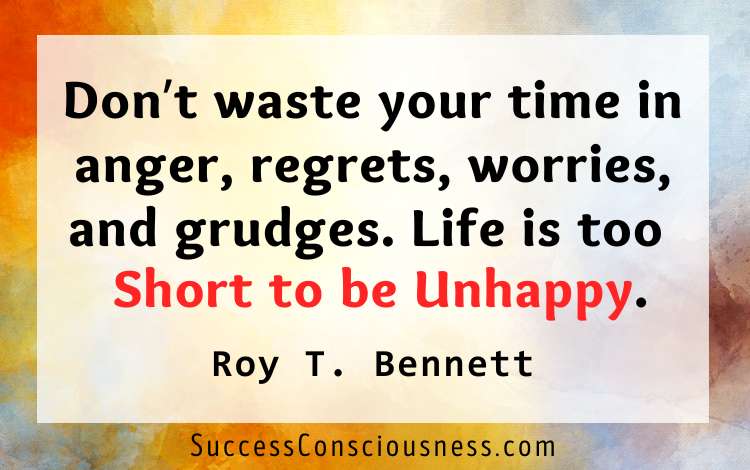Self Development
Don’t Waste Your Time in Anger, Regrets, Worries and Grudges

“Don’t waste your time in anger, regrets, worries, and grudges. Life is too short to be unhappy.”- Roy T. Bennett
This powerful message from Roy T Bennet reminds us of the importance of focusing on the positive aspects of life and letting go of the negativity that hinders our happiness and well-being.
Let’s explore this quote in depth so we can learn how to cultivate a more fulfilling and joyful life.
The Power of Positivity – The Antidote to Negative Emotions
Roy T. Bennett’s quote highlights the need to avoid wasting time on negative emotions such as anger, regrets, worries, and grudges, which can prevent us from experiencing true happiness.
To avoid these negativities, we need to cultivate the power of positivity in our lives.
Positivity is a powerful force that can transform our lives profoundly. It allows us to approach each day with a sense of hope and optimism, even in the face of adversity.
When we focus on the good in our lives, we attract more positive experiences and opportunities. In this regard, affirmations, visualization, positive self-talk, and a positive attitude are some of the most essential tools we need to use.
The Destructive Nature of Anger and Grudges
Anger and grudges are emotional burdens that can weigh us down, affecting our mental and physical health. Holding onto anger can lead to chronic stress, anxiety, and even depression. It can also impact our relationships, creating rifts and fostering resentment.
Grudges, in particular, keep us anchored to past hurts, preventing us from moving forward and finding peace.
Letting go of anger and grudges is not about excusing bad behavior or forgetting past wrongs. Instead, it is about freeing ourselves from the emotional chains that bind us.
Forgiveness is a powerful tool in this process. By choosing to forgive, we release the hold that negative emotions have on us, creating space for healing and growth.
This does not mean we have to reconcile with those who have hurt us, but rather that we choose to let go of the pain and resentment.
Moving Beyond Regrets
Regret is a natural human emotion that arises when we reflect on past actions or decisions we wish we had made differently.
While it is normal to experience regret, dwelling on it can prevent us from moving forward. Constantly ruminating on what could have been keeps us trapped in the past, unable to fully embrace the present or plan for the future.
To move beyond regrets, it is important to view them as learning opportunities rather than sources of self-punishment.
Reflect on what you can learn from the experience and how it can guide your future actions. Focus on what you can control and make positive changes in your life.
Remember Roy T. Bennet’s words: Life is too short to be unhappy. Don’t get stuck in the past. Live the present moment and use it as a foundation for a better future.
Overcoming Worries
Worrying is a common response to life’s uncertainties, but it seldom provides solutions. Chronic worrying can lead to a host of health problems, including anxiety, insomnia, and high blood pressure.
Worrying can also diminish our overall quality of life, preventing us from fully enjoying the present moment.
To effectively manage worries, it is essential to practice mindfulness and stress-relief techniques. Mindfulness involves staying present and fully engaging with the current moment rather than getting lost in thoughts about the future or past.
Techniques such as meditation, deep breathing, and yoga can help calm the mind and reduce anxiety. Additionally, engaging in regular physical activity is a powerful way to alleviate stress and boost mood.
Another effective strategy for overcoming worries is to adopt a problem-solving mindset. Identify the specific concerns causing you anxiety and take proactive steps to address them.
Break larger problems into smaller, manageable tasks, and focus on what you can control. By taking action, you empower yourself and reduce the sense of helplessness that often accompanies worry.
Read our quotes on anger.
Choosing Happiness
Happiness is a choice we make, often in the face of challenges and setbacks. By focusing on what we can control and letting go of what we cannot, we create space for joy and contentment in our lives.
One of the most effective ways to cultivate happiness is to surround ourselves with positive influences. This includes nurturing relationships with people who uplift and inspire us, as well as engaging in activities that bring us joy and fulfillment.
Choose Gratitude and Compassion
Practice gratitude by regularly reflecting on the positive aspects of your life and expressing appreciation for the people and experiences that make it meaningful.
Another key to happiness is self-compassion. Treat yourself with kindness and understanding, especially during difficult times. Recognize that everyone makes mistakes and that perfection is an unrealistic goal.
By being gentle with ourselves, we can build resilience and maintain a positive outlook even in the face of adversity.
Practical Steps to a Happier Life
Let’s read again the quote of Roy T. Bennett, “Don’t waste your time in anger, regrets, worries and grudges. Life is too short to be unhappy.”
To implement the wisdom of Roy T. Bennett’s quote into our daily lives, consider the following practical steps:
1. Mindfulness and Meditation
Incorporate mindfulness practices into your daily routine to stay grounded and present. Meditation can help calm the mind, reduce stress, and increase overall well-being. Even just a few minutes of deep breathing or a short meditation session can make a significant difference.
2. Healthy Relationships
Cultivate relationships that uplift and inspire you. Surround yourself with people who encourage your growth and bring positivity into your life. At the same time, it is important to distance yourself from toxic influences that drain your energy and contribute to negativity.
3. Physical Activity
Regular exercise is a powerful tool for boosting mood and reducing stress. Engage in activities you enjoy, whether it’s walking, running, dancing, or practicing yoga. Physical activity not only improves physical health but also enhances mental well-being.
4. Remind yourself of the good things in your life
Remind yourself often of the positives in your life. Each day, think about three things you are grateful for. This practice can shift your focus from what is lacking to what is abundant, fostering a sense of appreciation and contentment.
5. Pursuing Passions
Engage in hobbies and activities that ignite your passion and bring you joy. Whether it’s painting, playing a musical instrument, gardening, or cooking, dedicating time to activities you love can enhance your overall happiness and fulfillment.
6. Develop a sense of detachment
Being detached toward anger, regrets, and worries takes away their power over you. By diverting your attention away from them, they become insignificant in your life. We have covered this topic in our book Emotional Detachment for Happier Life.
Embrace Life’s Positivity and Be Happy
Roy T. Bennett quote encourages us to live a life free from the shackles of anger, regrets, worries, and grudges.
By embracing positivity and focusing on what truly matters, we can lead happier, more fulfilling lives. Life is too short to be unhappy; make the conscious choice to seek joy and spread positivity every day.
By following these principles, we take meaningful steps toward a brighter, happier future. By focusing on positivity and letting go of negativity, we can transform our lives and create a ripple effect of joy and contentment that extends to those around us.
Remember, life is too short to be unhappy-embrace each moment with gratitude and positivity, and watch as your life flourishes.
-

 Destination8 months ago
Destination8 months agoSingapore Airlines CEO set to join board of Air India, BA News, BA
-

 Breaking News10 months ago
Breaking News10 months agoCroatia to reintroduce compulsory military draft as regional tensions soar
-

 Gadgets3 months ago
Gadgets3 months agoSupernatural Season 16 Revival News, Cast, Plot and Release Date
-

 Tech News12 months ago
Tech News12 months agoBangladeshi police agents accused of selling citizens’ personal information on Telegram
-

 Productivity11 months ago
Productivity11 months agoHow Your Contact Center Can Become A Customer Engagement Center
-

 Gadgets4 weeks ago
Gadgets4 weeks agoFallout Season 2 Potential Release Date, Cast, Plot and News
-

 Breaking News10 months ago
Breaking News10 months agoBangladesh crisis: Refaat Ahmed sworn in as Bangladesh’s new chief justice
-

 Toys12 months ago
Toys12 months ago15 of the Best Trike & Tricycles Mums Recommend























